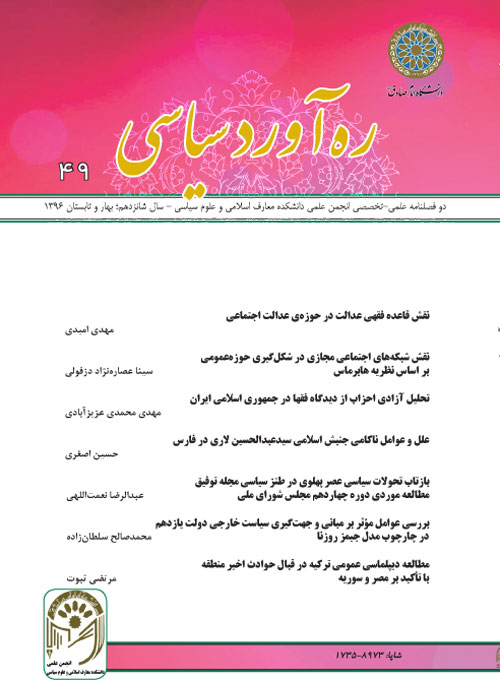فهرست مطالب
نشریه ره آورد سیاسی
پیاپی 35 (بهار 1391)
- بهای روی جلد: 50,000ريال
- تاریخ انتشار: 1391/07/01
- تعداد عناوین: 8
-
صفحه 1
-
صفحه 31
-
صفحه 43
-
Page 3Elucidating and describing the social crisis, an army of theories have come to sense to delivering a crisis management pattern whereby they can be controlled in minimal possible cost which the most of them are attributed from western ones and far from religious tenets, therefore defining the word and term “crisis” the both and studying its current principles and patterns, the present paper gauges the meaning of “crisis” in Holy Quran discourse in outset and then it will assess the crisis management in the war of Ahzab as case study and will answer what were the principles of Prophet Mohammad’s (pbuh)one in the war? In this respect the synonyms of the word in Holy Quran and the story of war of Ahzab and the his crisis management quality are made out which at last accounts for thirteen principles such as: prediction and preparedness, informing, preventing, fast responding, rebuilding, geting crisis maker factors rid of and assessing the crisis.Keywords: Holy Quran, Crisis, Crisis management, Prophet Mohammad(pbuh), War of Ahzab
-
Page 31Being as a theoretical conception, the social capital is an operational one as well what has made it striking and in the realistic crow's nest could be witnessed in solidaritybuilding, cooperationenforcing, affaireseasing and cost plummeting, so the arch question is what are the chief functions that social capital can carry out in society? Given that, defining the concept and grinding the two kind of it(within the group and linking), he gauges the functions.Keywords: Social capital
-
Page 43Possessing a high capacity in the Islamic discourse and enabling to cause basic changes, thespirituality is not an individual matter whereby its torrent of effective functions in both politics andsociety are ignored, which can be seen in ramifications in the politics without religion. Today in power debate as the uppermost element in politics, the soft power has dominated in both theory and practice. today in power debate as the uppermost element in politics, the soft power has dominated in both theory and practice. The main question of the article is identity of the spiritual power in Holy Quran which is deferent form hard and soft one that is represented by Holy Quranso if thespirituality as source of the spiritual power goes beyond of individual affairs and turns into a social one whereby peoples, society and the state are attached to so the spiritual power will be produced. In respect to identity, sources, sorts and functions in Holy Quran, Thespiritual power can influence all other power effect and alongside with global hunt for spirituality the world future is on the side of those who preoccupy the public culture, politics and economy, what is ready for Islamic discourse especially in social sciences.Keywords: Islam, Quran, Spirituality, Ethic, Politics, Power. Soft Power
-
Page 69Regarded as thought and sociological issue, assessing the identity of power is compulsory in that on one hand to do away from its corruption s and on the other to put the aims of political system into practice, which scholars whether notice on or not has responded it, among them the recent western thought literature is about soft power theory which is after Stevin Likes’s shaping preferences theory what also suffers from some defects and some other predicaments in this matter are reminded. Considering the bases of the soft power in Iranian supreme leader’s thought is root change in identity and kind of power that in this regard the Devine base of political power is against the concept of hegemony therefore the faithful society is obligated to exert Devine tasks by its help that is unique model in which corruption has done away from while the increase of power is on the table.Keywords: Power, Syed Ali Khamenei, Velayt system, Social capital, Hegemony, Religious democracy
-
Page 93Although the international relations theories Stand on some special trans-theoretical bases, but the bases are deferent from one to another theory which Islamic theory is among one of them meaning that its trans-theoretical bases are deferent from the others, given that by descriptive-analyzing method, the paper seeks to cast light on the relationship between Islam and the trans-theoretical bases of the international relation and then elucidate it in Islam, so the most significant fruit of the article is introducing the Islamic culture as the most essential framework to shape the trans-theoretical angles of international relation in the Islamic discourse.Keywords: International relation, Trans, theory, Ontology, Epistemology, Methodology, Islam
-
Page 129Gauging and making out the several operative components on the process of the American foreign policy making and wielding, this article will go into detail on the role of think tanks in the process hailing from stipulation of conceal whereby politicians lean towards to decide in best one what will cause the negligible problems coming from the more intricate tortuousstocks and concerns that could be regarded as opening point for think tanks which they make a foreign policy efficacious by expert advises, given that knowing the role think tanks is highly imperative because the foreign policy is composed by actions and reactions convoluted in the process. however This paper making an allowance for the increasing role of them, illuminate their features as well astheir effectiveness in American foreign policy making with laying emphasis on Iranian issues.Keywords: Foreign policy, Think tanks, Decision making, Iran, USA


